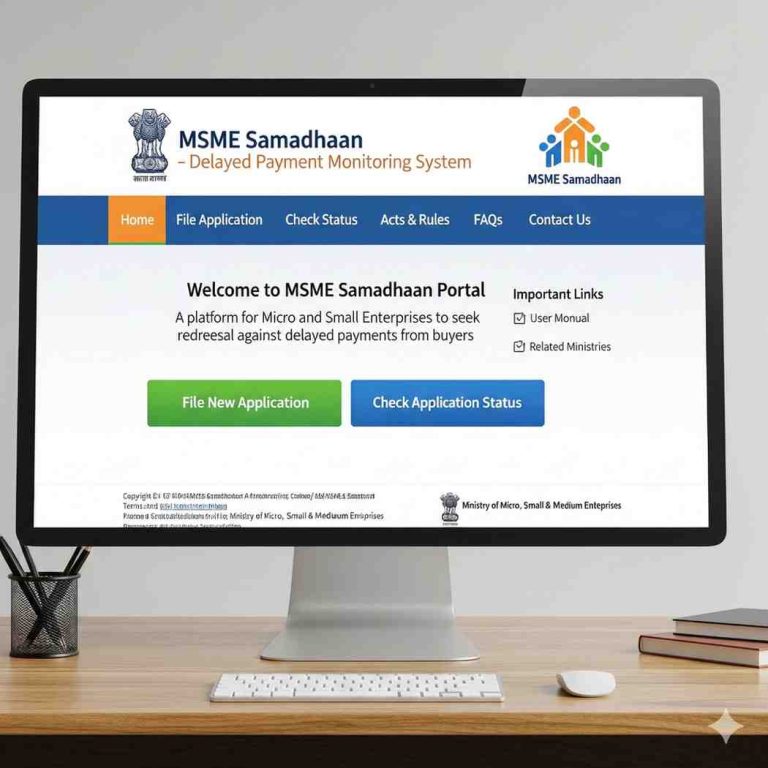MSME Payment Recovery Legal Services: A Guide
Last Updated: September 12, 2025
Table of Contents:
- Understanding MSME Payment Recovery
- Why Timely Payment Recovery is Critical for MSMEs
- The MSMED Act and Samadhaan Portal: Your Allies in Payment Recovery
- Step-by-Step Guide to Filing a Complaint on the Samadhaan Portal
- Common Challenges and How to Overcome Them
- When to Seek Professional Legal Help
- FAQs About MSME Payment Recovery
- Quick-Start Summary & Checklist
- Key Takeaways
- About the Author
- References
- Disclaimer
Understanding MSME Payment Recovery
MSME payment recovery is the legal process through which Micro, Small, and Medium Enterprises (MSMEs) can reclaim overdue payments from their buyers. The Micro, Small and Medium Enterprises Development (MSMED) Act, 2006, provides a robust framework for this, primarily through the MSME Samadhaan portal, which facilitates the filing and resolution of such disputes in a time-bound and efficient manner.
Why Timely Payment Recovery is Critical for MSMEs
Delayed payments can cripple the operations of any business, but for MSMEs, the impact can be devastating. Here’s why prompt MSME payment recovery is not just important, but essential for survival and growth:
- Maintaining Healthy Cash Flow: MSMEs often operate on tight budgets. Delayed payments can lead to a severe cash crunch, making it difficult to meet daily operational expenses.
- Fueling Growth and Expansion: Timely payments are crucial for investing in new equipment, technology, and talent, which are the key drivers of growth.
- Building a Strong Financial Reputation: A healthy balance sheet improves your creditworthiness and makes it easier to secure loans and investments.
- Avoiding the Debt Trap: When payments are delayed, MSMEs are often forced to take on high-interest loans to stay afloat, which can lead to a vicious cycle of debt.
The MSMED Act and Samadhaan Portal: Your Allies in Payment Recovery
The Indian government has recognized the challenges faced by MSMEs and has put in place a strong legal framework to protect their interests.
The MSMED Act, 2006
This act is the cornerstone of MSME protection in India. Key provisions include:
- 45-Day Payment Rule: A buyer is required to make payment to an MSME supplier within 45 days of accepting the goods or services.
- Compound Interest: If a buyer fails to make payment within the stipulated time, they are liable to pay compound interest at three times the bank rate notified by the Reserve Bank of India.
The MSME Samadhaan Portal
Launched by the Ministry of MSME, the Samadhaan portal is an online platform that allows MSMEs to file applications for delayed payments. It’s a game-changer for MSME payment recovery because:
- It’s Fast and Efficient: The portal streamlines the entire process, from filing a complaint to its resolution.
- It’s Cost-Effective: It eliminates the need for expensive and time-consuming court proceedings.
- It’s Transparent: You can track the status of your application online at any time.
Case Study 1: A small manufacturing unit that was struggling to recover a payment of ₹25 lakhs from a large corporation. The buyer kept delaying the payment, citing frivolous reasons. The Manufacturing Unit filed a complaint on the Samadhaan portal, and within 90 days, the matter was resolved through conciliation, and the client received the full payment along with interest. This case is a testament to the effectiveness of the Samadhaan portal in levelling the playing field for MSMEs.
Step-by-Step Guide to Filing a Complaint on the Samadhaan Portal
Filing a complaint on the Samadhaan portal is a straightforward process. Here’s what you need to do:
- Register on the Portal: You’ll need your Udyam Registration Number and Aadhaar Number to register.
- File the Application: Fill in the online application form with details of the buyer, the amount due, and the date from which it is due.
- Upload Documents: You’ll need to upload copies of the invoices, purchase orders, and any other relevant documents.
- Submit the Application: Once you’ve filled in all the details and uploaded the documents, you can submit the application.
- Track the Status: You’ll receive a unique application number that you can use to track the status of your complaint.
Alt text: The homepage of the MSME Samadhaan portal for payment recovery.
Common Challenges and How to Overcome Them
While the Samadhaan portal is a powerful tool, you may still face some challenges:
- Incomplete Documentation: Make sure you have all the necessary documents in order before filing a complaint.
- Non-Cooperative Buyers: Some buyers may refuse to participate in the proceedings. In such cases, the MSE Facilitation Council can issue an ex-parte order.
- Technical Glitches: The portal may sometimes experience technical issues. Be patient and persistent.
Case Study 2: A software development company had a dispute with a buyer over the quality of their work. The buyer refused to make the final payment, claiming that the software was not up to the mark. The client was advised to file a complaint on the Samadhaan portal. During the conciliation proceedings, a detailed report was presented from a third-party expert that validated the quality of the claimant’s work. The buyer had no choice but to settle the matter and make the payment.
When to Seek Professional Legal Help
While the Samadhaan portal is designed to be user-friendly, there are times when it’s best to seek the help of MSME Samadhaan lawyers in India.
- Complex Cases: If your case involves complex legal issues or a large amount of money, it’s advisable to have a lawyer represent you.
- Disputed Claims: If the buyer is disputing your claim, a lawyer can help you build a strong case and present it effectively.
- Enforcement of Orders: If the buyer fails to comply with the order of the MSE Facilitation Council, a lawyer can help you enforce it through the courts.
Case Study 3: An MSME that had won an award from the MSE Facilitation Council, but the buyer refused to pay. An execution petition was filed in the court to get the award enforced. This experience taught me that while the Samadhaan portal is a great platform, you sometimes need the expertise of MSME payment recovery lawyers in India to see the process through to the end.
Quick-Start Summary & Checklist
Summary: The MSMED Act and the Samadhaan portal provide a powerful and effective mechanism for MSME payment recovery. By understanding the process and seeking professional help when needed, you can ensure that you get paid on time, every time.
Checklist:
- Ensure you have a valid Udyam Registration.
- Maintain proper documentation of all your transactions.
- Send a formal reminder to the buyer before filing a complaint.
- Gather all the necessary documents for filing the complaint.
- Consult with an MSME payment recovery lawyer in India if your case is complex.
Key Takeaways
- Timely payment recovery is crucial for the financial health of MSMEs.
- The MSMED Act and the Samadhaan portal are powerful tools for MSME payment recovery.
- Proper documentation is key to a successful recovery claim.
- Don’t hesitate to seek professional legal help when needed.
FAQs About MSME Payment Recovery
A1: Any Micro or Small Enterprise with a valid Udyam Registration can file a complaint.
A2: Yes, a complaint must be filed within three years from the date the payment became due.
A3: The complaint is forwarded to the concerned MSE Facilitation Council, which will initiate conciliation proceedings. If conciliation fails, the matter is referred to arbitration.
A4: Yes, the decision can be challenged in the high court, but only on specific grounds.
A5: No, there are no fees for filing a complaint on the portal.
A6: The MSMED Act mandates that the MSE Facilitation Council must decide on the matter within 90 days.
About the Author

Shanmugapriya is an esteemed Advocate of the High Court of Madras, with over a decade of extensive experience in managing complex legal cases, particularly in commercial disputes and debt recovery. Her expertise spans various legal forums, including Commercial Courts, the National Company Law Tribunal, and arbitration panels. Shanmugapriya is recognized for her practical, results-oriented approach and her deep understanding of both Indian and international commercial law, making her a trusted advisor for foreign entities navigating the Indian legal landscape.
Disclaimer
Legal Disclaimer: The information provided in this blog post is for general informational purposes only and should not be construed as legal advice. The legal landscape is subject to change, and the information may not be current or applicable to your specific situation. It is strongly recommended that you consult with a qualified legal professional for advice tailored to your individual needs.
Editorial Standards & References
This article was written to provide accurate, evidence-based information. It has been reviewed for legal accuracy and clarity by legal professionals.
References
- The Ministry of Micro, Small and Medium Enterprises, Government of India. (2006). The Micro, Small and Medium Enterprises Development Act, 2006. Retrieved from https://msme.gov.in/sites/default/files/MSMED_Act_2006.pdf
- The Ministry of Micro, Small and Medium Enterprises, Government of India. (n.d.). MSME Samadhaan. Retrieved from https://samadhaan.msme.gov.in/MyMsme/MSEFC/MSEFC_Welcome.aspx
- The Reserve Bank of India. (n.d.). Bank Rate. Retrieved from https://www.rbi.org.in/Scripts/BS_PressReleaseDisplay.aspx?prid=54203
- The Ministry of Micro, Small and Medium Enterprises, Government of India. (n.d.). Udyam Registration. Retrieved from [suspicious link removed]

